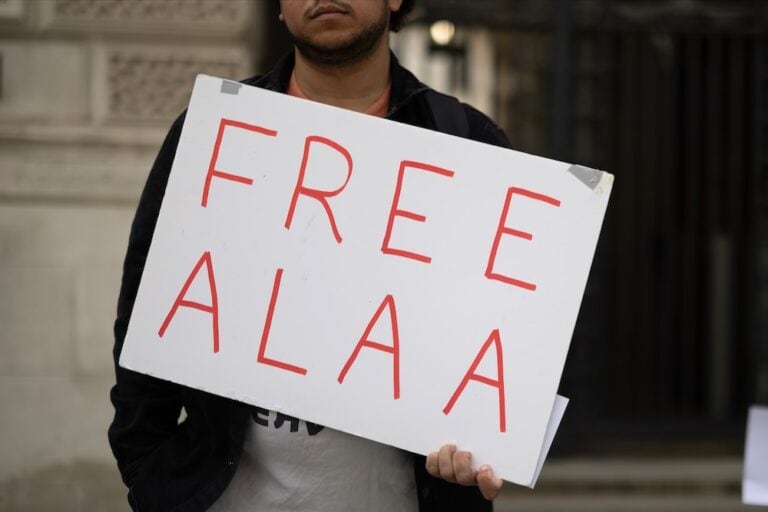It is well documented that Bahrain’s record on freedom of expression is deeply problematic, and the British government, one of Bahrain's major allies, is doing far too little to press the island country on freedom of expression issues and other human rights violations.
An incident on this year’s World Press Freedom Day, 3 May, raises serious questions about the British government’s policy towards Bahrain. The British embassy in Manama marked the occasion by posting on its website two articles that argued against freedom of expression, denigrated Bahraini rights groups and justified government repression of sections of society.
One article, written by a representative of the pro-government group, Citizens for Bahrain, praised King Hamad for bringing “true freedom of the press” to Bahrain, while warning that “people do not understand the responsibility that comes with this freedom.” The other, written by Anwar Abdulrahman, the editor of the pro-government newspaper Akhbar Al-Khaleej, claimed that “so-called human rights organisations” are “largely administered by ex-ideologists and even terrorists”. It continued: “As much as beasts cannot be left to roam freely, so in human society the feral element’s freedom should be under control.”
In fact, it is well documented that Bahrain’s record on freedom of expression is deeply problematic – and getting worse. The courts have sentenced peaceful activists to life in prison solely for exercising their rights to free expression and assembly, and in April 2013 the government increased the maximum penalty for defaming the king from two years to five.
In April 2012, the Bahrain ministry of rights and social development revoked the travel permits for representatives from the Committee to Protect Journalists,Reporters Without Borders, Index on Censorship and Pen International. In a joint letter to the Bahrain government, these groups called the decision “a deliberate effort to undermine transparent reporting by independent observers and limit their access to the country.”
In the case of the two articles on the embassy website, the British government’s website carried a disclaimer that the two articles did not reflect its views, and the Foreign and Commonwealth Office (FCO) later issued two disclaimers on its twitter feed. And it’s true that by the disarming logic of free speech, even those who call for restrictions on the principle should have their voice heard. Yet by failing to counterbalance anti-free speech views – with which the British government stated it “definitely does not agree” – with pro-free speech ones, the embassy in Manama leaves itself open to the criticism that it cares less about promoting freedom of expression in Bahrain than cosying up to the country’s repressive government.
Beyond these web postings, the British government is doing far too little to press Bahrain on freedom of expression issues. After all, Bahrain ranks 165 out of 179 countries in the 2013 edition of the World Press Freedom Index (collated by Reporters Without Borders). British citizens have themselves fallen foul of Bahrain’s restrictions on free expression; between 17 February 2011 and April 2013, at least thirty-eight journalists, including British journalists from the BBC, theFinancial Times, Channel 4 and Sky news, were either denied visas to travel to Bahrain, denied access on arrival in the country, or deported. Britan’s foreign secretary William Hague expressed concern about the temporary detention of the Channel 4 journalists, but as far as we have been able to determine, neither the embassy in Manama nor the FCO has commented further.
At the same time, security ties between the two countries remain strong. On 29 April, the head of the UK Trade and Investment Defence and Security Organisation (UKTI DSO), Richard Paniguian, and the British defence attache, Commodore Christopher Murray, met with the Bahrain minister for defence affairs, Lieutenant-General Dr Shaikh Mohammed bin Abdullah Al Khalifa, in Manama to discuss “bilateral military cooperation”. Were human-rights issues raised at the meeting? It seems unlikely.
In the wake of the UK embassy webpage debacle, the Gulf expert Christopher Davidson noted that while Britain’s policy may lead to “short-term economic benefits,” downplaying human-rights violations is hardly in Britain’s strategic interests. Such an approach may “cause long-term damage to the UK’s reputation” amongst the region’s large numbers of young people.
Some members of the foreign-affairs committee of the UK parliament, which is conducting an inquiry into FCO policy on Bahrain and Saudi Arabia, have expressed scepticism about Britain’s ability to influence events in the Gulf, especially around human rights. But through trade, investment and security ties, Britain has leverage with the ruling Al-Khalifas, and should be prepared to use this much more assertively in defence of free expression and other human rights. In December 2012, Bahrain’s crown prince praised Britain for its support. “You have stood head and shoulders above others”, he said, making no mention of the United States.
If the British government is serious about standing up for free expression and human rights in Bahrain, it should call publicly and forcefully for the immediate release of all those peaceful Bahraini activists imprisoned for exercising their basic right to freedom of expression and association, and urge an immediate lifting of the restrictions on the exercise of these basic freedoms.
Nicholas McGeehan is a Middle East researcher at Human Rights Watch who follows developments in Bahrain.


